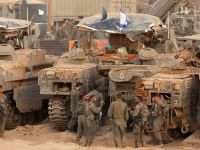A ruling coalition partner in Algeria drawing support from ethnic Berbers is due to pull out of President Abdelaziz Bouteflika's government because of deadly riots in the Kabylie region, a French daily reported Monday.
A senior official with the Rally for Culture and Democracy (RCD), a secular party whose support base comes from Berbers in Kabylie, said the party was ready to leave the ruling coalition in the wake of a deadly military crackdown against protesters in the northeastern mountainous region, where some 50 people from the Berber ethnic group have been killed in riots over the last week.
"We condemn the repressive treatment by the government and we are drawing political conclusions from this," Rafik Hassani, the party's secretary general, told Le Parisien newspaper.
The secular RCD, led by Said Sadi, a well-known human rights activist, holds five percent of parliamentary seats.
"This is a break-up. The decision will be made official tomorrow, after a meeting of our national council," Hassani said.
Angry students launched fresh anti-government protests and clashed with riot police in several towns in Kabylie at the weekend. Twenty-nine people were killed on Saturday.
President Bouteflika was scheduled to address the nation on Monday evening, official sources said, but they gave no indication on whether he would break the government's virtual silence on the riots.
In Paris, meanwhile, more than 1,000 people demonstrated in front of Algeria's embassy on Sunday, accusing authorities of being "assassins".
The violence in Kabylie, a hotbed of opposition, was sparked on April 18 after a teenager in police custody was shot dead and three other youths were manhandled for shouting anti-government slogans at police.
But longstanding grievances among the Berber community, who have complained of systemic discrimination, unemployment and housing shortages, have fuelled the unrest.
On Monday, French radio, citing an official from another political party with strong support in the region, said that youth groups in Kablyie had become increasingly radical due to poverty and a clamp-down on political and human rights.
"Their radical transformation is the result of an absence of political life in Algeria, and the strangling of public freedoms," Hocine Ait-Ahmed, the president of the Socialist Forces Front (FFS), said in an interview on France Inter.
Ait-Ahmed said the Algerian people were "living under increasing poverty" and that young people no longer believed in political change.
The Berbers of Kabylie were in the forefront of Algeria's liberation struggle against France, but a colonial divide-and-rule policy continued after independence in 1962, heightening antagonism between Arabs and Berbers, who charge systematic discrimination – PARIS (AFP)
© 2001 Al Bawaba (www.albawaba.com)







